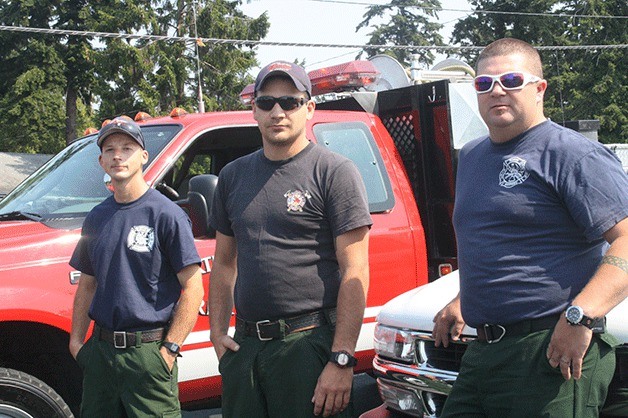Seven North Whidbey firefighters are having a busier summer than usual.
Part of a regional strike team that fights wildfires, the group has been sent out five times already, and the wildfire season isn’t over yet.
Busy season can last well into September, said Ryan McCarthy, a member of this strike team since 2004. And he doesn’t expect to spend a lot of time at home for the next few weeks.
“This is an abnormal year,” McCarthy said.
“This many fires in this short amount of time.”
Starting July 7, firefighters from North Whidbey Fire and Rescue were called out to help. Five helped battle the Carlton Complex wildfire, the largest in state history.
Five days after they returned home, a group was sent out again, to the Rising Eagle wildfire.
Fewer than 24 hours after returning from that blaze, McCarthy, Chris Turner and Tom Mohlsick were dispatched to Snag Canyon. They returned Sunday night.
Washington State Patrol is in charge of organizing the strike teams, McCarthy said. They make the decision on which teams are called, to where and for how long.
The group is also paid by the State Patrol.
Strike teams are usually called out for about five to 10 days, though the time ranges anywhere between three days to two weeks, which is the maximum amount of time a team can be out.
Unless there is pressing need for them to stay longer, McCarthy said.
“At this point, state resources are getting pretty thin,” McCarthy said.
There were already 12 state mobilizations of strike teams this summer, and one fire even had a strike team from New Mexico.
“When resources are getting thin, you start pulling from all over,” McCarthy said.
Because he has a wife and two children, McCarthy said being away can be difficult for him and his family, but he enjoys the work.
“I just kind of fell in love with this aspect,” he said of fighting wildland fires. “When we go over there, it’s kind of like a long camping trip.
“The camaraderie is different, is pretty cool.”
Mohlsick said he went to a class to be qualified for the strike team because fighting wildland fires appealed to his love of camping and the outdoors.
“It’s completely different from regular structural fire fighting because you do have that built-in camaraderie with everyone else you’re working with,” Mohlsick said.
The strike team they’re a part of draws firefighters from Island, San Juan, Whatcom, Skagit and Snohomish counties, and there are strike teams from all over the state.
“You get to see a lot of people, you get to meet a lot of people, and it’s just fun,” Mohlsick said.
“You create a brotherhood between all the guys on the strike team,” Turner said. “It’s been a lot of fun, getting to know everyone from all the different areas.”
Though McCarthy has served on the team for 10 years, both Mohlsick and Turner are in their first year as wildland firefighters. Stories from fellow strike team members helped inspire them both to join this aspect of firefighting.
Neither Turner nor Mohlsick said they mind the fast pace and quick turnaround.
McCarthy, on the other hand, finds it a little more difficult.
“I’ve started to notice, the last couple times, it was a little tiring, but it’s not too bad,” McCarthy said. “You kind of think, toward the end of the fire, ‘Oh, I can’t wait to get home.’
“But once I get home, get my clothes washed, I’m ready to go again.
“We enjoy going out there, supporting other communities,” McCarthy said. “It’s nice to be able to go to another district, and they’re just super happy to see people come in and help them fight their fires.”



